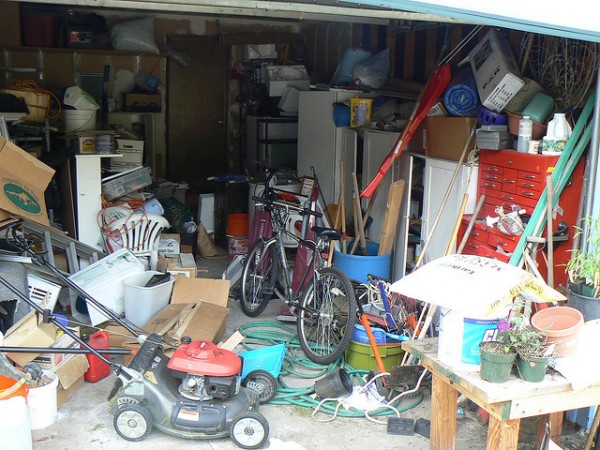6 Lessons on Story from Cleaning the Garage
My wife and I realize that we have fallen into a trap. We are trying to tell an incredible story with our lives by buying more stuff. Stuff that inevitably seems to end up in our garage collecting dust.
Our house is full of things we don’t need and certainly never use.
- Clothes that we hoped would make us feel better about ourselves.
- Toys that we hoped would make our kids happy. Or at least occupied.
- Kitchen gadgets that would make our food taste better.
- Exercise equipment that would motivate us to actually exercise.
The stuff we really never use is typically placed in the garage. It has become a symbol of the messy, boring story we are living. A story of stuff.

photo by Janet Crum (creative commons)
So we chose to use our labor day weekend to labor. We cleaned out our garage. For us it became a necessity to clean in order to live a better story of our own.
Here are 6 lessons on story I learned from cleaning up our mess.
1. Start early. I was in the garage working by 8am. At noon I had completed two thirds of the work and stopped for the day. By starting early, I was able to enjoy the rest of my day. If I had waited until 10 or 11 to start, it would have been harder to ever get going. And then I would have been tempted to quit earlier in the process.
Starting early made the rest of my day more enjoyable. I read some. Dozed off a little. Played with the kids. We made a trip to the mall. And had time for family movie night. Getting work done early made the day better.
When we start living a good story sooner than later, we enjoy the benefits sooner than later. The best time to start is now. Never later.
2. Solve problems by beginning the work. When I first stepped into the garage, I didn’t know where to start. The mess was overwhelming. Stories are no different. When we focus on where we want to be in 20 years, we often have no idea what we should do right now. The complexity and difficulty become obstacles.
To clean my garage I didn’t need the perfect plan. I just needed to start. Your story is the same. Don’t worry about what is going to happen years from now. Do what you can now.
The only way to write chapter 20, is to start with the first. Once it is done, proceed to the second. Over time your story will develop.
3. Embrace simplicity. It was very hard deciding what to get rid of. There were items that we felt we might use again some day. Maybe. It was tempting to keep more. But if we had, then we would have been straightening our mess, not cleaning it up.
Our family’s goal is to tell a story of love. Love for each other. Love for the poor and needy. Our story is better when we stick to this simple plot. Everything else has the potential to distract.
There are items we clutter our life stories with that we probably need to get rid of. The simpler we keep it, the easier it is to manage. The easier it is to adjust when a new opportunity comes around. The easier it is to keep telling a good one.
The best stories are simple ones.
4. Good stories take more than one day to tell. I didn’t finish Saturday. I couldn’t. But I finished enough of the work that I can do some of it better on a different day. Like take all of the trash or get rid of paint cans. By starting I made it possible for my garage to get even cleaner over the next week.
Stories are like wine. If you have all of the ingredients correct, then they get better as they age.
5. Good work breeds good work. When I stepped out into my garage this morning, I felt good. Good because I had decided to do the job and showed up. Good because my muscles were sore and I had grown as part of the process. Good because the mess was gone. These feelings help motivate me to clean even more.
Easy stories provide good feelings today, but disappointment tomorrow. Better stories are hard work at the beginning, but provide benefits later on.
6. Habits are the most important thing in our life. The mess in my garage wasn’t made all at once. It happened because every day we made it a little bit messier. Our habits define who we are. We can choose messy habits. Consumerism habits. Ignoring the problems habits. Or we can choose good habits. We can throw garbage away. We can think twice before we buy something. We can straighten a little bit each day.
Our habits, whether good or bad, add up over time. This summation of habits is what determines the quality of our story.
How have your habits affected your story?
You can leave a comment by clicking here.
